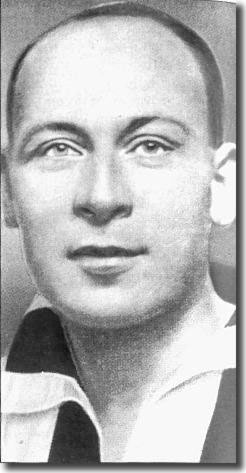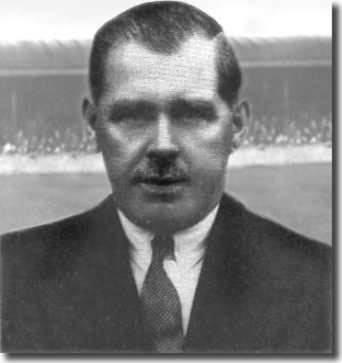 After
their first short taste of the big time, Leeds United were relegated back
to the Second Division at the end of 1926/27.
Manager Arthur Fairclough immediately
resigned his post. The Leeds board were desperate for an early return
to Division One and they sought a replacement who would be good enough
to satisfy their needs.
After
their first short taste of the big time, Leeds United were relegated back
to the Second Division at the end of 1926/27.
Manager Arthur Fairclough immediately
resigned his post. The Leeds board were desperate for an early return
to Division One and they sought a replacement who would be good enough
to satisfy their needs.
Dick Ray was the easy solution
to their problem, having already had a relationship of twenty
years with Elland Road, starting when as a left back he followed
his manager Gilbert Gillies
from Chesterfield to Leeds City for their first season of League
football back in 1905. He had been the first United manager and
had been assistant to Arthur Fairclough until he went his own
way in the close season of 1923. He had moved on to Doncaster
Rovers but was happy to return to Elland Road when the call came.
Despite the relegation, Fairclough had left a strong side behind him:
Jimmy Potts was an ever present in 1926/27 and on his way to being United's
outstanding keeper between the wars; Willis
Edwards, Tom Townsley and George Reed were a dependable half-back
line, while Tom Jennings and Russell Wainscoat were threatening up front.
One of Fairclough's last acts at Leeds had been to fork out a then massive
£5,600 to secure the services of Scottish international schemer John White,
who was to be a star of the team for the next three seasons. Leeds could
have turned a quick profit on White when First Division Sheffield United
offered them £6,000 for him in November. The board turned down the offer
and stuck with White, who was taking a while to settle in the English
game.
Clearly, the Elland Road ship was not sinking, but it needed
someone to make the best of the potential and Ray was that man.
He shipped out a number of players in the close season, including
Percy Whipp and Billy Jackson, but strengthened the squad with
the capture of forwards Charlie Keetley and Joe Firth. He went
on to add others throughout the rest of his first season in charge,
including Alex Stacey and George Milburn, who were both signed
for the future.
Dick Ray was determined to cling on to his star players. With all mainstays
present at the start of 1927/28, the Yorkshire Post sensed optimism
at Elland Road. 'The enforced return of Leeds United to the Second Division
has awakened a new spirit among the management and players alike. There
is a feeling that United's setback is only temporary ... the utmost confidence
is felt that a team which includes players of such outstanding merit as
Townsley, Edwards, Jennings and White will make a bold strike for a return
to the higher status.'
With the left flank strengthened by Tom Mitchell, whose direct surging
runs ruffled many defences, Leeds announced their intentions on the first
day of the season as they ripped apart South Shields in a 5-1 away win,
with White hitting two of them. 'The effect on morale of such a victory
is incalculable. With confidence restored, Leeds should stand out in the
Second Division,' predicted the Yorkshire Post. White added another
to his tally in the 2-2 home draw with Barnsley. Two further home wins
followed against Southampton (2-0) and Nottingham Forest (4-0). The goals
were flowing freely with White, Jennings and Wainscoat all on the way
to wonderful seasons.
The club were losing the odd match here and there, but by the
beginning of December had won half of their 16 matches, scoring
38 goals in the process. They had stuffed five past Swansea and
won 6-2 at home to Reading.
It was about this time that Ray pulled off a tactical masterstroke by
moving Townsley into the problem position of right-back and recalling
Ernie Hart to the team at centre-half. He had tried the move temporarily
in September when right-back Harry Roberts was injured, but he now made
the switch permanent, with immediate rewards. In December and January,
the side won seven straight victories with the goals flowing freely. Tom
Jennings inspired that run with four goals in the first victory, by 5-0
at home to Chelsea. He hit another two in the 5-1 victory over Stoke and
was having a massive impact on Second Division defences.
Although Jennings was laid low intermittently through the effects of
blood poisoning, Dick Ray maintained his team's momentum with the mid-season
acquisition from non-league football of centre-forward Charlie Keetley.
Keetley was one of five footballing brothers, the rest of whom played
at various times for Doncaster Rovers under Ray. For Keetley, the higher
standard in league football made no difference to his habits - he continued
scoring as if for fun, running in 18 goals during Leeds' final 16 matches.
A 3-2 win at Stamford Bridge against promotion rivals Chelsea, delivered
by two goals from Keetley and one from White, ensured United's immediate
return to the First Division. The match drew a crowd of 47,562 and was
worthy of the occasion. The Yorkshire Post: 'The exchanges were
extraordinarily fast and keen and reached a high standard of cleverness."
On their return to Midland Station in Leeds that night, United were greeted
as heroes by hordes of supporters including the Lord Mayor and Mayoress.'
But Jennings was struggling with a bout of blood poisoning and
Ray brought Charlie Keetley in as replacement. He repaid Ray's
faith by scoring in both of his first two games, a 3-0 win at
home to South Shields and a 4-1 away victory at Southampton. Leeds
lost their next game, the FA Cup Third Round tie away to Manchester
City, who they were vying closely with at the top of the Second
Division table, but then Keetley scored again in the 2-2 draw
at Forest and hit all three goals in the 3-2 win over Bristol
City. A new hero had been found and formed a deadly forward line
along with Wainscoat, Bobby Turnbull, White and Tom Mitchell.
Keetley was proving a more than capable substitute for Jennings
and was now a main man. The two didn't play in the same side until
the following season.
Leeds struggled through February, suffering a couple of defeats, but
came back strongly at the end of the month. They beat Fulham, drew the
next match and  then
won eight of the next 9, with the only goals against coming at the end
in a 3-2 win away to promotion rivals Chelsea. During that run Keetley
really came good, scoring 12 times, with hat tricks in the 6-0 thumping
of Notts County and the 4-0 win over Clapton Orient.
then
won eight of the next 9, with the only goals against coming at the end
in a 3-2 win away to promotion rivals Chelsea. During that run Keetley
really came good, scoring 12 times, with hat tricks in the 6-0 thumping
of Notts County and the 4-0 win over Clapton Orient.
back to top
With two games left, Leeds were on 57 points and were already
certain of promotion. They still had to face their closest rivals
for the title, Manchester City, along with another team in the
shake up for promotion, Stoke City. Unfortunately, Leeds lost
both matches, with the last seeing them going down 5-1 at Stoke.
A win in either match would have given Leeds the title, but as
it turned out City won the Championship by a clear two points.
City's 1-0 win at Elland Road before a record attendance at the
ground of 49,799 had been crucial.
For all that stumble at the death, it had still been a magnificent
season for the club, bouncing back up to Division One at the first
attempt and hitting a club record 98 goals in the process. Jennings
and White were joint top scorers with 21 apiece and Wainscoat
and Keetley each hit 18, with Charlie's haul coming in just 16
matches, a remarkable haul. The wingers, Bobby Turnbull and Tom
Mitchell, also contributed 8 each.
They were older and wiser after a year back in Division Two and
could look forward with some hope to another shot at the big time.
Other Football Highlights from 1927/28
- A year after George Camsell had torn up the goalscoring record books,
Dixie Dean shredded them again when he overhauled Camsell's 59 league
goals in the last match of the season. But with three matches to go
the 21 year old Everton and England centre-forward was nine short of
the record. Dean scored two against Aston Villa, four against Burnley
and required a hat trick against Arsenal to reach 60. Although Everton
had already won the championship, more than 48,000 packed Goodison on
5 May to see if he could pull it off. He got two in the first half but
had to wait until the 82nd minute to smash the record when he soared
above the Gunners defence to score his 40th header of the season from
a corner
- When Huddersfield lost 3-1 to Blackburn in the FA Cup final they became
the first team since Barnsley in 1910 to score in a final and fail to
win the trophy
- Tottenham were relegated from the First Division with 38 points, the
highest total for a club going down. The seven teams that finished immediately
above Spurs all had 39 points, and only four points separated bottom
of the table Middlesbrough (37 points) and tenth-placed Arsenal
- Scotland came to Wembley at the end of March and, in the pouring rain
and in front of 80,000 people, proceeded to give England a lesson in
how football should be played. The 'Wee Blue Devils' - hat trick hero
Alex Jackson was the tallest of the forwards at 5ft 7in - turned on
an exhibition of ball skill and artistry to run out 5-1 winners and
were forever after known as the 'Wembley Wizards'












 After
their first short taste of the big time, Leeds United were relegated back
to the Second Division at the end of 1926/27.
Manager Arthur Fairclough immediately
resigned his post. The Leeds board were desperate for an early return
to Division One and they sought a replacement who would be good enough
to satisfy their needs.
After
their first short taste of the big time, Leeds United were relegated back
to the Second Division at the end of 1926/27.
Manager Arthur Fairclough immediately
resigned his post. The Leeds board were desperate for an early return
to Division One and they sought a replacement who would be good enough
to satisfy their needs. then
won eight of the next 9, with the only goals against coming at the end
in a 3-2 win away to promotion rivals Chelsea. During that run Keetley
really came good, scoring 12 times, with hat tricks in the 6-0 thumping
of Notts County and the 4-0 win over Clapton Orient.
then
won eight of the next 9, with the only goals against coming at the end
in a 3-2 win away to promotion rivals Chelsea. During that run Keetley
really came good, scoring 12 times, with hat tricks in the 6-0 thumping
of Notts County and the 4-0 win over Clapton Orient.